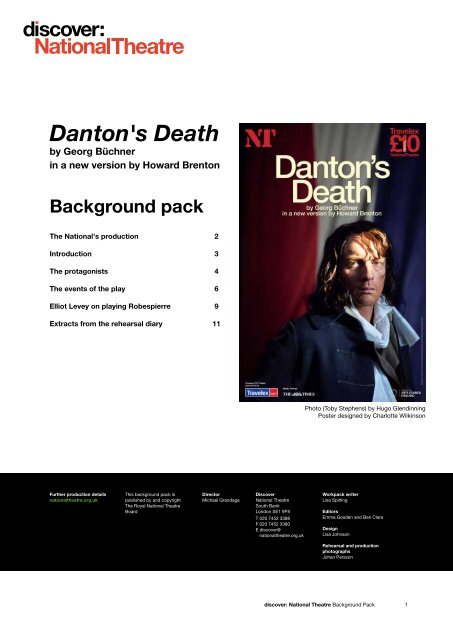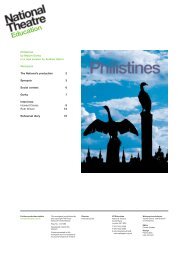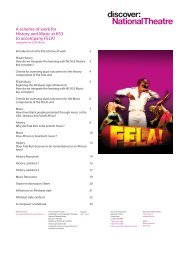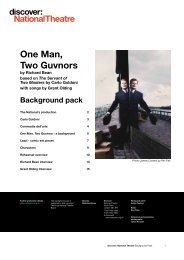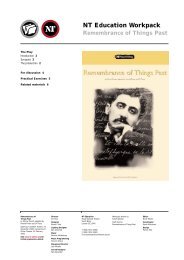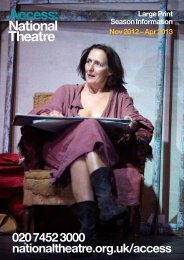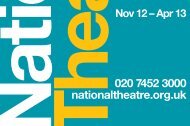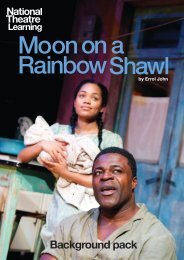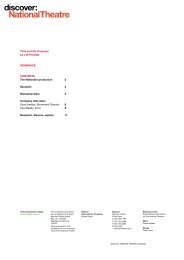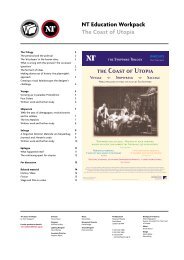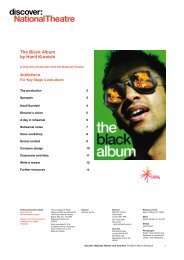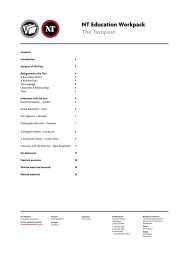Danton's Death - National Theatre
Danton's Death - National Theatre
Danton's Death - National Theatre
You also want an ePaper? Increase the reach of your titles
YUMPU automatically turns print PDFs into web optimized ePapers that Google loves.
<strong>Danton's</strong> <strong>Death</strong><br />
by Georg Büchner<br />
in a new version by Howard Brenton<br />
Background pack<br />
The <strong>National</strong>'s production 2<br />
Introduction 3<br />
The protagonists 4<br />
The events of the play 6<br />
Elliot Levey on playing Robespierre 9<br />
Extracts from the rehearsal diary 11<br />
Further production detailsls:<br />
nationaltheatre.org.uk<br />
This background pack is<br />
published by and copyright<br />
The Royal <strong>National</strong> <strong>Theatre</strong><br />
Board<br />
Reg. No. 1247285<br />
Registered Charity No.<br />
224223<br />
Views expressed in this<br />
workpack are not necessarily<br />
those of the <strong>National</strong> <strong>Theatre</strong><br />
Director<br />
Michael Grandage<br />
Discover<br />
<strong>National</strong> <strong>Theatre</strong><br />
South Bank<br />
London SE1 9PX<br />
T 020 7452 3388<br />
F 020 7452 3380<br />
E discover@<br />
nationaltheatre.org.uk<br />
Photo (Toby Stephens) by Hugo Glendinning<br />
Poster designed by Charlotte Wilkinson<br />
Workpack writer<br />
Lisa Spirling<br />
Editors<br />
Emma Gosden and Ben Clare<br />
Design<br />
Lisa Johnson<br />
Rehearsal and production<br />
photographs<br />
Johan Persson<br />
discover: <strong>National</strong> <strong>Theatre</strong> Background Pack 1
The <strong>National</strong>’s production<br />
Dantonists<br />
Georges Danton . . . . . . . . . . . . . . . . . . . . Toby Stephens<br />
Legendre . . . . . . . . . . . . . . . . . . . . . . . Ashley Zhangazha<br />
Camille Desmoulins . . . . . . . . . . . . . . . . . . . Barnaby Kay<br />
Lacroix . . . . . . . . . . . . . . . . . . . . . . . . . . . . . . Gwilym Lee<br />
Hérault-Sechelles . . . . . . . . . . . . . . . . . . . . . Max Bennett<br />
Julie, Danton’s wife . . . . . . . . . . . . . . . . . . . . . Kirsty Bushell<br />
Lucile, Desmoulins’ wife . . . . . . . . . . . . . . Rebecca O’Mara<br />
Marion, a prostitute . . . . . . . . . . . . . . . . .Eleanor Matsuura<br />
Members of the Committee of Public Safety<br />
Robespierre . . . . . . . . . . . . . . . . . . . . . . . . . . Elliot Levey<br />
Saint-Just . . . . . . . . . . . . . . . . . . . . . . . . . . Alec Newman<br />
Barère . . . . . . . . . . . . . . . . . . . . . . . . . . . . . Phillip Joseph<br />
Collot d’Herbois . . . . . . . . . . . . . . . . . . . .Chu Omambala<br />
Duplay, Robespierre’s landlady . . . . . . . . . . . . . . . Judith Coke<br />
Eléonore, Duplay’s daughter . . . . . . . . . . .Rebecca Scroggs<br />
Elisabeth, Duplay’s daughter . . . . . . . . . . . . Elizabeth Nestor<br />
Herman, President of the Revolutionary Tribunal . .Michael Jenn<br />
General Dillon, prisoner in the Conciergerie . . . .David Beames<br />
A Lyonnais . . . . . . . . . . . . . . . . . . . . . . . . . Ilan Goodman<br />
Citizens . . . . . . . . . . . . . . . . . . . . . . . . . . Stefano Braschi<br />
Jason Cheater<br />
Emmanuella Cole<br />
Taylor James<br />
David Smith<br />
Jonathan Warde<br />
Director . . . . . . . . . . . . . . . . . . . . . . . . Michael Grandage<br />
Designer . . . . . . . . . . . . . . . . . . . . . . . .Christopher Oram<br />
Lighting Designer . . . . . . . . . . . . . . . . . . Paule Constable<br />
Music and Sound . . . . . . . . . . . . . . . . . . . . . Adam Cork<br />
Company Voice Work . . . . . . . . . . . . . . Jeannette Nelson<br />
Staff Director . . . . . . . . . . . . . . . . . . . . . . . . . .Lisa Spirling<br />
This production of <strong>Danton's</strong> <strong>Death</strong> opened<br />
in the <strong>National</strong>’s Olivier <strong>Theatre</strong> on 22 July 2010<br />
Toby Stephens as Georges Danton<br />
Photo by Johan Persson<br />
discover: <strong>National</strong> <strong>Theatre</strong> Background Pack 2
Introduction<br />
<strong>Danton's</strong> <strong>Death</strong> is the astonishing début<br />
play of Georg Büchner written in 1835 when<br />
he was just 21. Set in 1794 at the bloody<br />
climax of the French Revolution, the play<br />
charts the final days of the revolutionary<br />
Danton as he faces the demons of his past<br />
and his ever present struggle for survival.<br />
Robespierre, previously a friend but now<br />
sitting in judgement has the heavy task<br />
of deciding <strong>Danton's</strong> fate and a titanic<br />
struggle begins. The play is of such scale<br />
that it is infrequently staged in the United<br />
Kingdom but with it's historical weight, vivid<br />
characters, exceptional rhetoric and universal<br />
themes of the basic rights of man it presents<br />
an irresistible challenge for a director and<br />
their creative team.<br />
This production, in an adaptation by Howard<br />
Brenton, seeks to encapsulate the energy<br />
and life force of revolutionary times with an<br />
exhilarating on-rush of scenes that builds<br />
Toby Stephens in <strong>Danton's</strong> <strong>Death</strong><br />
Photo by Johan Persson<br />
in momentum to a brutal finale. Staged without<br />
an interval and within a flexible space, there is the<br />
intention that the revolution should feel right outside<br />
the walls and that those involved are doing all they<br />
can to keep up and stay alive. The play and this<br />
production celebrates the art of rhetoric and what it<br />
is to live in a time when theoretical discussions and<br />
arguments drove men to action and to changing their<br />
country.<br />
This background pack gives you an insiders' look<br />
into the rehearsal process, the research and the<br />
ideas that went in to putting the show together. The<br />
pack includes an outline of the happenings of the<br />
play both on stage and off, along with interviews and<br />
extracts of the rehearsal diary to give an insight into<br />
how this production built up to what we see on the<br />
Olivier stage now.<br />
Lisa Spirling<br />
Staff Director<br />
discover: <strong>National</strong> <strong>Theatre</strong> Background Pack 3
The protagonists<br />
Georges Danton<br />
As a leading figure in the early stages of the<br />
French Revolution he was the first President of<br />
the Committee of Public Safety. <strong>Danton's</strong> role in<br />
the onset of the Revolution has been disputed;<br />
but many historians describe him as the chief<br />
force in the overthrow of the monarchy and the<br />
establishment of the First French Republic. By 1794<br />
he was a moderating influence on the Jacobins, he<br />
was guillotined by the advocates of revolutionary<br />
terror after accusations of venality and leniency to<br />
the enemies of the Revolution.<br />
Robespierre<br />
One of most influential figures of the French<br />
Revolution, Maximilien Robespierre dominated the<br />
Committee of Public Safety and was instrumental<br />
in this period of the Revolution, known as the Reign<br />
of Terror which ended with his own arrest and<br />
execution in 1974. His supporters called him "The<br />
Incorruptible".<br />
Danton, Robespierre and Marat in a wine shop © Bettman/CORBIS<br />
Camille Desmoulins<br />
A revolutionary journalist who became part<br />
of Danton’s inner circle. He wrote the political<br />
pamphlets La France Libre and Vieux Cordelier.<br />
Having attended the same school as Robespierre<br />
they were once close friends and Robespierre was<br />
the godparent of Camille’s child.<br />
Lacroix<br />
A lawyer described as having “loud lungs and a<br />
hungry heart” (Thomas Carlyle). Part of Danton’s<br />
close circle of friends.<br />
Hérault-Sechelles<br />
A politician, president of the Legislative Assembly<br />
and the Convention who affiliated with Danton.<br />
As a member of the Reign of Terror's Committee of<br />
Public Safety, Hérault was chiefly concerned with<br />
diplomacy. Hérault was accused of treason, and<br />
after being tried before the Revolutionary Tribunal,<br />
was condemned at the same time as Danton.<br />
discover: <strong>National</strong> <strong>Theatre</strong> Background Pack 4
The protagonists (continued)<br />
St Just<br />
A close ally of Robespierre he served with him on<br />
the Committee of Public Safety and was heavily<br />
involved in the Reign of Terror. Anything Robespierre<br />
wanted to get done St Just was sent to do it.<br />
The Duplays<br />
Robespierre resided within the Duplay Household<br />
and was tended to by Madame Duplay and her<br />
daughters Elizabeth and Eleonore.<br />
Collot<br />
A prominent figure on the Committee of Public<br />
Safety, having been previously an actor and<br />
an essayist, he administered the execution of<br />
more than 2’000 people in Lyon and supported<br />
Robespierre in his usurping of Danton.<br />
Toby Stephens in <strong>Danton's</strong> <strong>Death</strong><br />
Photo by Johan Persson<br />
Barrere<br />
A politician and journalist who became a member of the<br />
<strong>National</strong> Convention and the Committee of Public Safety. In<br />
March 1794 he was part of Robespierre’s faction. He was<br />
to be the last surviving member of the committee of Public<br />
Safety.<br />
Julie<br />
Danton’s wife. Danton was actually married twice. There is<br />
no mention of this in the play and in staging the play we have<br />
taken Julie to represent his first wife, imagining that she did<br />
not die.<br />
Lucille<br />
Camille’s wife.<br />
Marion<br />
A prostitute based at the Palais Royale.<br />
discover: <strong>National</strong> <strong>Theatre</strong> Background Pack 5
The events of the play: onstage and offstage<br />
Events in italics do not take place on stage. This<br />
gives context for the company to fill in the gaps<br />
of what is talked about in the play or relevant<br />
historical events of the period.<br />
Discover more about this period:<br />
en.wikipedia.org/wiki/Reign_of_Terror<br />
23 March Robespierre and Danton are together at<br />
the Montagnards (a political group apposing the<br />
Girondists).<br />
24 March The Herbetists have been guillotined.<br />
Discover more: en.wikipedia.org/wiki/<br />
H%C3%A9bertists<br />
25 March: Day One in Danton’s <strong>Death</strong><br />
Legendre, Camille, Lacroix and Hérault have come<br />
from the Place de la Revolution where the guillotine<br />
executions take place.<br />
Act 1, scene 1<br />
It is early evening, around 6pm. Danton, his wife<br />
Julie and his friends (the Dantonists) are enjoying<br />
themselves at the Palais Royale. Danton gives a<br />
sense of his apathy towards the Revolution and his<br />
desire for the killing to stop.<br />
26 March: Day Two of Danton’s <strong>Death</strong><br />
In the morning, immediately before Act 1 scene 2,<br />
the Paris mob attacks an aristocrat; Robespierre<br />
breaks it up and deals with the extremists. Elisabeth<br />
and Eleanore witness it.<br />
Act 1, scene 2<br />
At around midday Robespierre speaks to his<br />
landlady, Madame Duplay, about the mob attack.<br />
Throughout the scene he is aided in getting ready to<br />
go to the Jacobin Club by Madame Duplay and her<br />
daughters Eleanore and Elisabeth.<br />
Discover more: en.wikipedia.org/wiki/Jacobin_club<br />
Act 1, scene 3<br />
Approximately 2pm at the Jacobin Club. A Jacobin<br />
from Lyon speaks to the group in an attempt to<br />
Danton (Toby Stephens) and Julie (Kirsty Bushell)<br />
Photo by Johan Persson<br />
rally them to action in defence of the Revolution in<br />
Lyon. Legendre (a Dantonist) speaks of the need for<br />
action in Paris; Collot (a member of the Committee<br />
of Public Safety) assures him that the Revolution<br />
is in full flow and they have a handle on things.<br />
Robespierre speaks to the Club, making it clear that<br />
his new enemy, after getting rid of the Herbetists,<br />
are the moderates and the lovers of vice. Without<br />
naming names, it is clear Robespierre is referring to<br />
Danton.<br />
Discover more: en.wikipedia.org/wiki/Committee_<br />
of_public_safety<br />
Act 1, scene 4<br />
Lacroix tells Legendre off for speaking at the<br />
Jacobin Club and for putting the spotlight on the<br />
Dantonists. Lacroix tells Legendre that he is going<br />
to find Danton at the Palais Royale, probably with a<br />
prostitute.<br />
Herault has gone to see Robespierre at the Tuilleries.<br />
discover: <strong>National</strong> <strong>Theatre</strong> Background Pack 6
The events of the play: onstage and offstage<br />
(continued)<br />
Act 1, scene 5<br />
Approximately 6pm, at the Palais Royale. Danton<br />
and Marion (a prostitute) are kissing; Marion tells<br />
Danton of her first experience with a man and<br />
reaffirms the epicurean principle that what matters<br />
is what gives you pleasure.<br />
At some point that afternoon St Just sees Danton at<br />
the Palais Royale surrounded by prostitutes and the<br />
crowd.<br />
Act 1, scene 6<br />
Robespierre works late at the Tuileries Palace.<br />
9pm, Tuileries Palace (Offices of the Committee of<br />
Public Safety)<br />
Robespierre and Danton argue. Danton leaves.<br />
St Just arrives and they discuss the tactical attack<br />
on Danton.<br />
Danton goes to speak to the people on the ground.<br />
Act 2, scene 1<br />
Middle of the night at Danton’s home. Danton has<br />
a night terror about his actions in the September<br />
massacres; Julie (his wife) comforts him.<br />
27 March: Day Three in Danton’s <strong>Death</strong><br />
Act 2, scene 2<br />
Early morning, around 8am, at Danton’s house.<br />
The Dantonists; Lacroix, Camille, Herault and<br />
Lacroix (Gwilym Lee) and Danton (Toby Stephens)<br />
Photo by Johan Persson<br />
Legendre arrive to try and convince Danton to<br />
act in his defence against Robespierre. He leaves<br />
them all to go to the Palais Royale and insists the<br />
committee will not dare to arrest him.<br />
St Just has spent the day getting other signatures<br />
from the Committee of Public Safety for the<br />
warrant for Danton’s arrest.<br />
Act 2, scene 3<br />
10pm at the Tuileries Palace (Offices of the<br />
Committee of Public Safety). Robespierre is at<br />
work. St Just brings the warrant for Danton’s<br />
arrest, requiring Robespierre’s signature.<br />
Act 2, scene 4<br />
10.30pm at the Palais Royale.<br />
Danton, Camille, Lucille and others, are in limbo,<br />
discussing a play. A warning arrives that the<br />
Committee of Public Safety have decided to<br />
arrest Danton.<br />
Danton leaves for the country.<br />
Herault leaves for the Tuileries Palace.<br />
Lacroix goes to the raly people on the ground.<br />
28 March: Day Four in Danton’s <strong>Death</strong><br />
Herault is arrested and imprisoned at the<br />
Luxembourg Palace.<br />
29 March: Day Five in Danton’s <strong>Death</strong><br />
30 March: Day Six in Danton’s <strong>Death</strong><br />
Act 2, scene 5<br />
Having been in the countryside for a few days,<br />
Danton decides to take action and return to Paris.<br />
31 March: Day Seven in Danton’s <strong>Death</strong><br />
Act 2, scene 6<br />
Daytime. Some deputies in the <strong>National</strong><br />
Convention discuss the threat that Danton’s<br />
arrest poses to them. Legendre appeals to the<br />
Convention that Danton should be tried by<br />
them rather than the revolutionary tribunal. He<br />
wins their support, until Robespierre and St<br />
Just intervene and demand that Danton should<br />
have no special privileges and that this stage of<br />
discover: <strong>National</strong> <strong>Theatre</strong> Background Pack 7
The events of the play: onstage and offstage<br />
(continued)<br />
the revolution with all its bloodshed is necessary.<br />
Danton must be tried like everyone else.<br />
Act 3, scene 1<br />
Luxembourg Palace (which has been turned into<br />
a prison for political prisoners). Danton and the<br />
Dantonists are arrested and imprisoned. They meet<br />
General Dillon, a Girondist who went into hiding<br />
when the Girondists were purged and was then<br />
caught. He challenges Danton about his previous<br />
actions, arguing that all Danton has done and said<br />
has come back to him now.<br />
1 April: Day Eight in Danton’s <strong>Death</strong><br />
2 April: Day Nine in Danton’s <strong>Death</strong><br />
Act 3, scene 2<br />
At the Tuileries. Collot and Herman conspire to<br />
select reliable anti-Danton jurors to decide his fate.<br />
3 April: Day Ten in Danton’s <strong>Death</strong><br />
Act 3, scene 3<br />
The Revolutionary Tribunal, session 1.<br />
Danton stands up to Herman. The jury reminds all<br />
present what he has achieved for the Revolution<br />
and demand that his accusers appear. The session<br />
is suspended and the crowd support Danton.<br />
4 April: Day Eleven in Danton’s <strong>Death</strong><br />
Act 3, scene 4<br />
Julie reads what the newspaper says about the first<br />
session.<br />
Session 2 of the Tribunal starts.<br />
St Just has immediately taken the President of the<br />
Tribunal’s (Herman’s) notes to Robespierre once<br />
the second session ends but Robespierre doesn’t<br />
respond.<br />
Act 3, scene 5<br />
Members of the Committee of Public Safety (Collot,<br />
Barrére and St Just) meet to discuss Danton and<br />
the second session and what to do next. They<br />
decide to write an emergency decree.<br />
Act 3, scene 6<br />
At the same time, Danton, Lacroix, Herault and<br />
Camille are placed in a tough prison called the<br />
Conciergerie in between the 2nd and 3rd session.<br />
St Just goes to write the emergency decree.<br />
Act 3, scene 7<br />
Collot and Barrere look over the emergency<br />
decree that St Just has created. Herman panics<br />
slightly about the outcome of the 2nd session and<br />
prepares to go into the final one with a decree that<br />
stops Danton’s right to defend himself.<br />
Act 3, scene 8<br />
The third session of the revolutionary tribunal.<br />
Danton is stopped in his defence by the decree.<br />
He challenges the committee and is dragged off<br />
with his fellow Dantonists. St Just speaks to the<br />
crowd and poisons them against Danton and<br />
encourages them to follow Robespierre.<br />
Julie’s servant Madeline is present at the tribunal.<br />
Act 4, scene 1<br />
Julie speaks about Danton and how they are killing<br />
him out of fear. She gives her locket to Madeline to<br />
pass to Danton, saying she won’t see him like this.<br />
5 April: Day Twelve in Danton’s <strong>Death</strong><br />
Act 4, scene 2<br />
4am. Knowing these are their last hours alive the<br />
Dantonists talk through the night about life and<br />
loss.<br />
Act 4, scene 3<br />
Lucille is outside the prison, calling out for Camille.<br />
Act 4, scene 4<br />
The 'Final Four' are in the Conciergerie on the<br />
morning of their execution, supporting and<br />
energising each other. The warder arrives to take<br />
them to the guillotine.<br />
Act 4, scene 5<br />
Julie makes a farewell to her life and to Danton as<br />
she prepares to join him on his final journey.<br />
Act 4, scene 6<br />
At the Place de la Revolution, Camille, Herault,<br />
Lacroix and Danton are executed.<br />
discover: <strong>National</strong> <strong>Theatre</strong> Background Pack 8
Elliot Levey on playing Robespierre<br />
What kind of research did you undertake into the<br />
life of Robespierre?<br />
When you read more than one historical book, you<br />
see the same facts displayed. It’s day one of modern<br />
history. Just about everything he says in his speeches<br />
has survived, often second hand, but fairly accurate.<br />
They are more or less verbatim versions of his<br />
speeches, which read as if they were written giving<br />
you an insight into how he delivered his speeches.<br />
One of the recurring themes in research is that he is<br />
clearly not very good at public speaking. He had a<br />
terrible voice, was absurdly timid and a very nervous<br />
public speaker. What’s interesting about Robespierre<br />
and very revealing about his character is that he was<br />
clearly nervous but would then talk about his fear.<br />
For a massive political figure who reached that power<br />
he must have had absurd courage or oddity to talk<br />
about his shortcomings: that was the most exciting<br />
moment in research. When you read and read it’s all<br />
very interesting, but when you’re researching to act<br />
it’s a very different part of the brain. The acting bit<br />
of the brain kicks in and you are drawn to elements,<br />
which the ordinary reader might not find most<br />
interesting. This little bit of insight into his psychology<br />
is glorious for the actor. It shows you that he played<br />
his vulnerability, which tells you as an actor that<br />
the only way to talk about his vulnerability was to<br />
counter it. It’s interesting, in The Habit of Art [by Alan<br />
Bennett], the play I’ve just done, WH Auden says,<br />
“style is the sin of one’s imperfections”. What does<br />
that mean for Robespierre? It means that to posses<br />
that kind of self-knowledge, to have that sense of your<br />
shortcomings and to spin them and make something<br />
bizarrely winning about them is so exciting. It’s exciting<br />
because it’s what many actors are like.<br />
Did your research paint a very different picture of<br />
the character to the play?<br />
If I was researching Robespierre, not playing him,<br />
would I have picked up with such interest, certain<br />
traits I picked up? I’m understanding Robespierre<br />
through Buckner and Brenton to a certain extent. In<br />
our play there’s no talk of him being a bad orator, in<br />
fact he’s good. To a certain extent he wins people over<br />
with the power of his oratory. If you’re a Stanislavskian<br />
actor and you do your homework you go to a play and<br />
list all the references that other people say about you<br />
and what you say about yourself, so what was really<br />
interesting is that so many people say things about<br />
Robespierre when he’s not there. Some of them have<br />
to be true and many of them in this play are. They’re<br />
historically and theatrically true and all the interesting<br />
things about him are said when he’s not in the room.<br />
How the actor and the director choose to play with<br />
them or disregard them is something to be found in<br />
rehearsals. An example: Julie and Danton talk about<br />
Robespierre’s lack of sex. The truth is we don’t know.<br />
He may have been a sexual beast and he was so<br />
good at spinning his own image we have no real idea.<br />
Hilary Mantel in the novel A Place of Greater Safety<br />
absolutely tickles out the idea that there’s homosexuality,<br />
or bisexuality or his confused sexuality and there’s every<br />
indication that he was sexually in love with Camille,<br />
possibly with Danton.<br />
What happens when you’ve done the research?<br />
What happens when you’re done researching and you’re<br />
absorbed in the rehearsal process is you massively reject<br />
history. Its necessary and its also really satisfying. You<br />
shove loads of stuff in a metaphorical suitcase and you<br />
get rid of it.<br />
What’s Robespierre really like?<br />
The best thing I read was Hilary Mantel writing a review<br />
of Ruth Scurr’s biography of Robespierre and its very<br />
clear. Mantel says it emerges that for Robespierre “the<br />
incorruptible was also the unpredictable. He was a<br />
vociferous bundle of contradictions. He idealised the<br />
people and distrusted profoundly anyone who tried<br />
Elliot Levey in <strong>Danton's</strong> <strong>Death</strong><br />
Photo by Johan Persson<br />
discover: <strong>National</strong> <strong>Theatre</strong> Background Pack 9
Elliot Levey on playing Robespierre (continued)<br />
to speak for them. He distrusted the very structures<br />
of representation that he had to put in place. He saw<br />
power and he despised it.” He was timid, physically<br />
unappealing – he doesn’t look like a revolutionary. Lots<br />
of people fell in love with him. He was a very vain little<br />
man. He was a very prissy clothed man with his little<br />
wig. People were cutting their hair short and embracing<br />
rugged clothes. When I was a student in the early 90s<br />
the middle classes wore donkey jackets and aped<br />
the working classes. You reject the bourgeois for the<br />
accoutrements of the working class. He doesn’t follow<br />
the trend. Robespierre had the sense of self-awareness.<br />
“I’d feel like a burke if I conformed” he probably thought.<br />
What do you want the audience to think of him?<br />
It’s a question I can’t really answer. What does he want<br />
the people in the play to think of him? Even in the middle<br />
of the most climactic moment in history he always had<br />
his eye on posterity. It’s like that moment when Tony<br />
Blair said “the hand of history was on his shoulder”. The<br />
fact that he said that made it hysterical. It’s like having a<br />
moment about writing your memoirs in your memoirs. It’s<br />
that awful meta-theatrical thing. Both of the big speeches<br />
he has are almost verbatim - from the day it takes place.<br />
Why had Buchner cut and pasted these speeches in the<br />
way that he has? Robespierre’s speeches were written<br />
by him to have an effect. He’s not obviously speaking of<br />
Danton, but the play acts at being subtle, but does it in a<br />
brilliant crude way, which is delightful but difficult to play.<br />
How do you play bad acting?<br />
What is your process?<br />
It varies from show to show, but I don’t have a process.<br />
And the only rule is there are no rules. Michael Grandage<br />
was keen for lines to be learnt before rehearsals. It<br />
means you can start rehearsing much sooner. It means<br />
you have to do lots of homework so the lines you are<br />
locking down you’ve got are right. You do spend the rest<br />
of your time unpicking. Being cast early, I could churn<br />
my way through Eric Hobsbawm, Ruth Scurr and Simon<br />
Schama without having to worry about the script, then I<br />
read the script a lot, made all those instinctive decisions,<br />
then just read more until just before rehearsals. I stopped<br />
reading academically then started reading actorly. It requires<br />
the opposite of academic rigour: empathy, feeling,<br />
looseness.<br />
Also for Buchner Robespierre has a theatrical function.<br />
He is the antagonist. He stops at the end of act 2 and<br />
disappears. He is a classic device in that way, albeit a<br />
fully fleshed interesting device. You could just play him<br />
as the baddie and yet he was the most fantastic champion<br />
of the universal rights that we talk about today. He<br />
was calling for legislation for all sorts of things such as<br />
universal suffrage - things we take for granted in Western<br />
Europe. He campaigned for the abolition of the death<br />
penalty and slavery. Even giving voting right to Jews<br />
and actors, who at the time were despised. He was a<br />
hugely liberal spirit. He was originally a pacifist but then<br />
he had to save the revolution. Buchner was a revolutionary<br />
but not in a revolutionary time. He was writing in<br />
the 1830s so it was recent history. Danton’s mistresses<br />
were probably still alive. It’s like writers talking about<br />
Thatcher now.<br />
What’s changed since you first got the script to the<br />
end of rehearsals?<br />
The change hasn’t been revolutionary but it has been<br />
evolutionary. What I’m doing now is connected to day<br />
one but massively evolved and defined. There will be<br />
further refinement in performance.<br />
Elliot Levey in <strong>Danton's</strong> <strong>Death</strong><br />
Photo by Johan Persson<br />
discover: <strong>National</strong> <strong>Theatre</strong> Background Pack 10
Extracts from the rehearsal diary<br />
The journey from day one of rehearsals to the<br />
technical week on stage is impossible to capture<br />
fully. If you asked any of the company on opening<br />
night for the minutiae of how we got there, they<br />
would be hard pushed to explain it all in detail.<br />
However, the notes on the following pages – made<br />
throughout rehearsals – are highlights of some of<br />
the ideas, discussions and inspiration that took<br />
place, interspersed with information that gives<br />
a sense of how some rehearsal days panned out.<br />
Week One<br />
Monday<br />
Director Michael Grandage and designer<br />
Christopher Oram talk through the model box with<br />
the company of actors. Key ideas include the use<br />
of light as a major indicator of time-of-day and<br />
location. Along with this is the use of sound to<br />
create the world surrounding the play, outside and<br />
inside.<br />
We work through the play on its feet and in the<br />
space immediately. One of Michael's main methods<br />
of working is to have the actors explore the text<br />
within the space, this helps to get us out of the habit<br />
of working in our heads on the text, to lift us off the<br />
page and in to the play. The rehearsal room is set<br />
up with a replica skeleton structure of what we will<br />
have on stage. We look at each scene briefly to see<br />
what initial ideas and instincts come about.<br />
By immediately looking at the scenes in situation<br />
the sound designer Adam Cork is able to spend<br />
the first week seeing the whole play worked on (as<br />
opposed to working through it slowly, sitting around<br />
a table) in order that he and Michael can discuss<br />
composition and the arc / shape of the piece.<br />
ACT 1 SCENE 1<br />
At this stage, the actors are given complete freedom<br />
to cross the room if they want, and to interact with<br />
different groups. The cast consider a variety of<br />
options, including:<br />
1. Does every character in the room know each<br />
other?<br />
2. Does your character belong to the Palais and are<br />
you there to serve?<br />
3. Are you drinking?<br />
4. What has gone on in the moments before?<br />
Everyone was asked to make a note of what they all<br />
did.<br />
Michael Grandage in rehearsal<br />
photo: Marc Brenner<br />
discover: <strong>National</strong> <strong>Theatre</strong> Background Pack 11
Extracts from the rehearsal diary (continued)<br />
ACT 1, SCENE 2<br />
Background and asking questions<br />
It was a big decision for Michael Grandage and<br />
playwright Howard Brenton (who wrote the<br />
adaptation) to remove the mob from the play:<br />
Büchner was influenced by Shakespeare in the<br />
writing of the mob. We have been mindful that in<br />
taking it out, we didn’t want to lose their presence,<br />
as they are key to understanding the play.<br />
This is a scene that Büchner didn’t write: Brenton<br />
has taken the events in the original and turned them<br />
into a reported domestic scene that introduces us<br />
to Robespierre and the women (the Duplays) who<br />
worshipped him. The scene is set at the Duplay<br />
house where he had lodgings. Madame Duplay<br />
adored Robespierre and it was his sanctuary.<br />
Toby Stephens (Danton) and Eleanor Matsuura (Marion)<br />
in rehearsal<br />
photo: Marc Brenner<br />
ACT 1 SCENE 3<br />
Background and asking questions<br />
We share company research about the Jacobin<br />
Club. It started as a moderate club and heralded<br />
the beginning of political parties. You would pay<br />
for membership, but the clubs weren’t legislative.<br />
The Jacobins would vote to print something and<br />
that pamphlet would take on a political agenda<br />
and then be on the streets. There is the question<br />
of is it dangerous to be in attendance here – or the<br />
opposite, if you are not here it arouses suspicion. A<br />
sense of 'you are either with us or against us!'<br />
We talk about what it is to be in the same room<br />
or in the company of a political leader. Whatever<br />
your political leanings, being in their presence often<br />
impacts on you, so you can feel like a 'rabbit in the<br />
headlights'. This scene demonstrates Robespierre’s<br />
position in society and so how the listeners focus on<br />
him is vital.<br />
ACT 1 SCENE 5<br />
Background and asking questions<br />
Discussions of the inner life of the play come out of<br />
the scene being spoken out loud in situ with actors<br />
able to make discoveries as they play the scene and<br />
not just through textual analysis.<br />
The scene opens with Danton and his prostitute<br />
Marion. Marion’s speech illustrates epicurean<br />
philosophy, the philosophy of pleasure that the<br />
politics of the play is built upon.<br />
Toby Stephens, playing Danton, expresses that<br />
‘She articulates what I am already feeling, she is not<br />
necessarily teaching Danton anything. He is already<br />
leaning towards this way of thinking. It chimes with<br />
something that is latent in him. It is like my escape.’<br />
discover: <strong>National</strong> <strong>Theatre</strong> Background Pack 12
Extracts from the rehearsal diary (continued)<br />
ACT 1 SCENE 6<br />
Questions<br />
- What is the Timeframe and timing of this scene?<br />
- Where are we? We are at The Tuileries Palace<br />
which is the office of the Committee of Public<br />
Safety.<br />
- How much of this scene has happened when we<br />
join it?<br />
- Is it a point of tension, that is released by the<br />
opening line?<br />
- How reluctant is Danton to be there?<br />
- How big is their need to communicate?<br />
- Sound Design – there is a need to create<br />
something here that takes us out of the scene<br />
before and brings us here, into the city.<br />
ACT 2 SCENE 1<br />
Background and Asking questions<br />
We see clearly here the impact of the September<br />
Massacres on Danton and as a continuous theme<br />
throughout the play.<br />
ACT 2 SCENE 4<br />
This scene is potentially a lull in the action where<br />
we see the protagonists waiting for something to<br />
happen. This creates a strange tension that prompts<br />
the subject matter we see to be discussed.<br />
It is interesting to look at why Danton does not act<br />
and what is motivating him at this stage? Ideas<br />
suggested are that presumably if he was to act even<br />
more people would die, Danton is distressed and<br />
tired of that. It also says something extraordinary<br />
about the people surrounding him that no one else<br />
steps up to lead.<br />
Company discussions<br />
Every few days the entire company are brought<br />
together to discuss various key themes of the play,<br />
such as the historical references, the political terms<br />
and each of our various insights into the work.<br />
Robespierre’s virtue<br />
The virtue mentioned in the play is not a direct<br />
equivalent to the modern day English meaning of<br />
Virtue. For Robespierre it corresponds to his nature.<br />
There is a question of whether Danton’s embracing<br />
of indulgence and decadence is something that<br />
Robespierre cannot handle. Danton’s sensuality<br />
gives Robespierre a cause to fight against and we<br />
sense he took it all very seriously<br />
Classical references as inspiration<br />
The playwright references comparisons to classical<br />
civilisations that were made throughout the French<br />
revolution and not just in his version of events. The<br />
Roman model of the republic was in many respects<br />
the template for the French Revolution. Interestingly<br />
during the Russian Revolution they used the French<br />
Revolution as inspiration.<br />
ACT 2 SCENE 5<br />
Background and asking questions<br />
Danton is out alone in the open country. Whilst<br />
this is an exterior scene, it gives us an insight into<br />
the interior of him. There is a gloriousness to the<br />
speech, it goes on a journey, has ambiguity but also<br />
has it’s own arc.<br />
Elliot Levey (Robespierre) in rehearsal<br />
photo: Marc Brenner<br />
discover: <strong>National</strong> <strong>Theatre</strong> Background Pack 13
Extracts from the rehearsal diary (continued)<br />
We embark on a discussion of Atheism and Danton’s<br />
connection with it. Is he experiencing nihilism and how<br />
does that connect with him giving up?<br />
ACT 3 SCENE 1<br />
Background and Asking Questions<br />
The actors who have played Deputies in the previous<br />
<strong>National</strong> Convention scene now have to take on<br />
another character, this has implications on their<br />
through-line through the play and also costume. In<br />
terms of the citizens (which is the word we use to<br />
describe the additional unnamed characters), Michael<br />
Grandage is keen that we have a continuous flow<br />
of citizens to create the world of the play. These are<br />
representative of hundreds of people all the time,<br />
however it is vital that in each scene the identity of each<br />
character the actor plays is as clear to them as it is to<br />
us. There is a sense that we are striving for fantastic<br />
clarity in each moment of the piece.<br />
When working through this scene it is great to discover<br />
that it never settles; it is constantly active. It works well<br />
compositionally to have the existing prisoners start off<br />
stage right as the others enter stage left, at which time<br />
the existing prisoners can gather round with Dillon,<br />
cutting through the greetings.<br />
Taylor James and members of the company in rehearsal<br />
photo: Marc Brenner<br />
ACT 3 SCENE 6<br />
Discoveries on the rehearsal room floor<br />
As a company we have to get into the head of what<br />
it must be like to be a part of something that is so<br />
much bigger than you. The closest we have to it is<br />
9/11, knowing you are living something that is going<br />
to become historical. In these times people step up<br />
to lead. We need to communicate these characters<br />
existing and functioning in extremis: everything is on<br />
instinct. For example it is interesting that Lacroix looks<br />
to God but Danton doesn’t. This scene is in some<br />
respects a demonstration of how they each deal with<br />
their fear in approaching death.<br />
ACT 3 SCENE 8<br />
Background and Asking Questions<br />
The Third Tribunal, which we join in full flow. We see<br />
the Committee of Public Safety, use the decree to<br />
change the rules, end the tribunal and suggest that<br />
the jury have enough evidence to make their decision.<br />
At the beginning of the scene the crowd is<br />
on Danton’s side but by the end via St Just’s<br />
encouragement they are shouting in support of<br />
Robespierre.<br />
Discoveries on the rehearsal room floor<br />
The scene demonstrates how this production<br />
will work with an extraordinary level of collective<br />
responsibility. In only half a page of text we can help<br />
an audience understand the volatility of this period by<br />
bringing to life exactly what happened when St Just in<br />
Danton’s absence was able to turn the crowd.<br />
In order for this extraordinary turnabout to work we<br />
need to create an almost 'orchestral' style to the<br />
crowd response. To achieve this we start with the<br />
chant of ‘Danton Danton’ getting bigger and bigger<br />
and closer into unison. Once the first citizen speaks<br />
the actor must keep up the momentum but create<br />
space for it to be heard. Then when St Just speaks<br />
the actors must allow for the direction to be thrown<br />
and potentially send their characters in different<br />
directions.<br />
discover: <strong>National</strong> <strong>Theatre</strong> Background Pack 14
Extracts from the rehearsal diary (continued)<br />
Week One<br />
Friday<br />
The process is to work through the entire play each week<br />
with an expectation that when we come pack to it we<br />
will have moved on and are able to build on all that has<br />
gone before. The company are invited straight into the<br />
space and work through the scenes both physically and<br />
internally.<br />
ACT 1 SCENE 1<br />
Background and Asking Questions<br />
The company are asked to consider:<br />
- Where have you come from?<br />
- Why are you here?<br />
- What circumstances have you come from?<br />
- What is the imagined half page before we have joined<br />
you?<br />
Discoveries on the Rehearsal Room Floor<br />
In rehearsal we consider the practicalities of a three line<br />
opening encounter between Julie and Danton before the<br />
entrance of the rest of the Dantonists. There is a need<br />
to hone in on the couple before the big entrance. From<br />
initially focusing on a couple, the men’s entrance opens<br />
the whole room up.<br />
Elliot Levey (Robespierre) and Toby Stephens (Danton)<br />
photo: Johan Persson<br />
ACT 2 SCENE 5<br />
Something that came out of today’s session was that<br />
we shouldn’t give the impression that Danton has<br />
come to terms with his impending death. He goes<br />
close to it and then lets ‘they won’t dare’ energise it.<br />
Even the despair is fuelled by something more.<br />
ACT 4 SCENE 6<br />
We discuss the final moments of the play and the<br />
style in which the guillotines will take place. There is<br />
uniformity and sharpness to it that we hope will fit with<br />
the style of the play.<br />
Week Three<br />
By week three of the rehearsals the play has been<br />
worked through in its entirety and each scene is<br />
building up in detail, emotional depth and momentum<br />
every time we revisit it. Notes and ideas, as can be<br />
observed below, are fed in to various scenes as<br />
required.<br />
ACT 2 SCENE 4<br />
The energy that opens this scene is proving quite<br />
difficult to decipher. Potentially the scene could start<br />
in a silence that Herault feels compelled to break. This<br />
idea is tried and then we play with the idea that the<br />
scene opens and they are discovered in place in a<br />
tense slightly feverish mode, awaiting news. Danton<br />
is disconnected from this and when he tunes in to the<br />
chatter it is to cut through it.<br />
Once the news of Danton’s arrest comes through, a<br />
shift occurs and the energy of the room transforms.<br />
ACT 2 SCENE 5<br />
We look at how Danton is revealed in the space, we<br />
follow the idea that he would run on, stop for breath<br />
and in the pause ruminate and decide to return. We<br />
think about what makes him stop, is he deluding<br />
himself, or is this the moment of clarity when he<br />
decides to go back and fight.<br />
discover: <strong>National</strong> <strong>Theatre</strong> Background Pack 15
Extracts from the rehearsal diary (continued)<br />
ACT 3 SCENE 3<br />
Michael Grandage talks to the company about the<br />
context and weight of this scene. In particular this is<br />
the first moment where we see Danton being exactly as<br />
he is remembered historically. Technically we have the<br />
responsibility of delivering the revolutionary leader how he<br />
is best known into his natural habitat.<br />
Toby Stephens (Danton)<br />
Photo by Johan Persson<br />
Week Three<br />
Thursday<br />
Language of the Scene Changes<br />
The scene changes have a theatricality, fluidity and<br />
language of their own. Michael works with the company<br />
and sound designer Adam Cork to create this language.<br />
Michael takes time to work through with the company the<br />
details of how each transition will work, so for example<br />
light fading slowly on the final speaker in the scene,<br />
windows opening, exiting, entering and scene starting.<br />
This helps to ensure the company don’t feel vulnerable or<br />
disjointed by the process.<br />
Week Four<br />
Thursday<br />
At this stage the whole company are brought together<br />
and congratulated on what has been achieved so far.<br />
We start to run a few scenes together and sound is<br />
introduced.<br />
While there is time to look at all moments in detail as<br />
required, we are now creating something together with<br />
sound and lighting and gradually build to full runs of the<br />
play. There is a desire to celebrate the stage we are on<br />
(the Olivier) and recognise the need for distance and<br />
breathing space upon it.<br />
discover: <strong>National</strong> <strong>Theatre</strong> Background Pack 16


